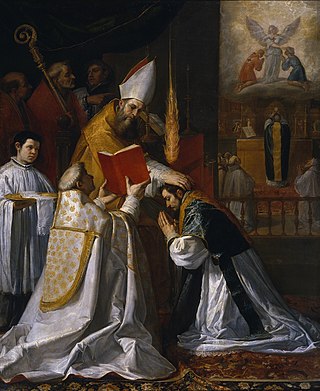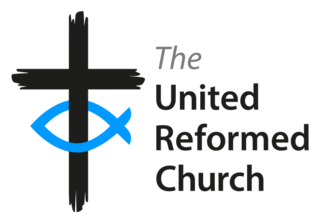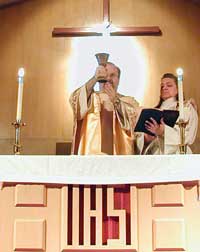Related Research Articles

The Christian Church (Disciples of Christ) is a mainline Protestant Christian denomination in the United States and Canada. The denomination started with the Restoration Movement during the Second Great Awakening, first existing during the 19th century as a loose association of churches working towards Christian unity, then slowly forming quasi-denominational structures through missionary societies, regional associations, and an international convention. In 1968, the Disciples of Christ officially adopted a denominational structure at which time a group of churches left to remain nondenominational.

In certain Christian denominations, holy orders are the ordained ministries of bishop, priest (presbyter), and deacon, and the sacrament or rite by which candidates are ordained to those orders. Churches recognizing these orders include the Catholic Church, the Eastern Orthodox, Oriental Orthodox, Anglican, Assyrian, Old Catholic, Independent Catholic and some Lutheran churches. Except for Lutherans and some Anglicans, these churches regard ordination as a sacrament.

The Presbyterian Church (USA), abbreviated PC (USA), is a mainline Protestant denomination in the United States. It is the largest Presbyterian denomination in the country, known for its liberal stance on doctrine and its ordaining of women and members of the LGBT community as elders and ministers. The Presbyterian Church (USA) was established with the 1983 merger of the Presbyterian Church in the United States, whose churches were located in the Southern and border states, with the United Presbyterian Church in the United States of America, whose congregations could be found in every state.

A deacon is a member of the diaconate, an office in Christian churches that is generally associated with service of some kind, but which varies among theological and denominational traditions. Major Christian churches, such as the Catholic Church, the Oriental Orthodox Churches, the Eastern Orthodox Church, the Scandinavian Lutheran Churches, the Methodist Churches, the Anglican Communion, and the Free Church of England, view the diaconate as an order of ministry.
Presbyterianpolity is a method of church governance typified by the rule of assemblies of presbyters, or elders. Each local church is governed by a body of elected elders usually called the session or consistory, though other terms, such as church board, may apply. Groups of local churches are governed by a higher assembly of elders known as the presbytery or classis; presbyteries can be grouped into a synod, and presbyteries and synods nationwide often join together in a general assembly. Responsibility for conduct of church services is reserved to an ordained minister or pastor known as a teaching elder, or a minister of the word and sacrament.

The United Reformed Church (URC) is a Protestant Christian church in the United Kingdom. As of 2022 it has approximately 40,000 members in 1,284 congregations with 334 stipendiary ministers.

Ordination is the process by which individuals are consecrated, that is, set apart and elevated from the laity class to the clergy, who are thus then authorized to perform various religious rites and ceremonies. The process and ceremonies of ordination vary by religion and denomination. One who is in preparation for, or who is undergoing the process of ordination is sometimes called an ordinand. The liturgy used at an ordination is sometimes referred to as an ordination.
The Evangelical Lutheran Church in America (ELCA) is a mainline Protestant Lutheran church headquartered in Chicago, Illinois. The ELCA was officially formed on January 1, 1988, by the merging of three Lutheran church bodies. As of 2021, it has approximately 3.04 million baptized members in 8,724 congregations.

The United Church of Canada is a mainline Protestant denomination that is the largest Protestant Christian denomination in Canada and the second largest Canadian Christian denomination after the Catholic Church in Canada.

The Uniting Church in Australia (UCA) was founded on 22 June 1977, when most congregations of the Methodist Church of Australasia, about two-thirds of the Presbyterian Church of Australia and almost all the churches of the Congregational Union of Australia united under the Basis of Union. According to the church, it had 243,000 members in 2018. In the 2016 census, about 870,200 Australians identified with the church; in the 2011 census, the figure was 1,065,796. The UCA is Australia's third-largest Christian denomination, behind the Catholic and the Anglican Churches. There are around 2,000 UCA congregations, and 2001 National Church Life Survey (NCLS) research indicated that average weekly attendance was about 10 per cent of census figures.

The United Church of Christ (UCC) is a mainline Protestant Christian denomination based in the United States, with historical and confessional roots in the Congregational, Calvinist, and Lutheran traditions, and with approximately 4,700 churches and 745,230 members. The United Church of Christ is a historical continuation of the General Council of Congregational Christian churches founded under the influence of New England Pilgrims and Puritans. Moreover, it also subsumed the third largest Calvinist group in the country, the German Reformed. The Evangelical and Reformed Church and the General Council of the Congregational Christian Churches united on June 25, 1957, to form the UCC. These two denominations, which were themselves the result of earlier unions, had their roots in Congregational, Lutheran, Evangelical, and Reformed denominations. At the end of 2014, the UCC's 5,116 congregations claimed 979,239 members, primarily in the U.S. In 2015, Pew Research estimated that 0.4 percent, or 1 million adult adherents, of the U.S. population self-identify with the United Church of Christ.
Lay presidency is a form of celebrating the Lord's Supper whereby the person presiding over the sacrament is not an ordained minister of religion. Similarly, when the celebrant is a deacon rather than a presbyter, the term diaconal presidency is used.

In some Christian denominations, a reader or lector is the person responsible for reading aloud excerpts of scripture at a liturgy. In early Christian times the reader was of particular value due to the rarity of literacy.

In Anglicanism, a licensed lay minister (LLM) or lay reader is a person authorised by a bishop to lead certain services of worship, to preach and to carry out pastoral and teaching functions. They are formally trained and admitted to the office, but they remain part of the laity, not of the clergy.

The Anglican ministry is both the leadership and agency of Christian service in the Anglican Communion. "Ministry" commonly refers to the office of ordained clergy: the threefold order of bishops, priests and deacons. More accurately, Anglican ministry includes many laypeople who devote themselves to the ministry of the church, either individually or in lower/assisting offices such as lector, acolyte, sub-deacon, Eucharistic minister, cantor, musicians, parish secretary or assistant, warden, vestry member, etc. Ultimately, all baptized members of the church are considered to partake in the ministry of the Body of Christ.
Youth ministry, also commonly referred to as youth group, is an age-specific religious ministry of faith groups or other religious organizations, usually from ages 12 to 30, whose mission is to involve and engage with young people who attend their places of worship, or who live in their community. Christian youth ministry usually encompasses one or more of the following:
Marion Pardy, a diaconal minister and author, was the 37th Moderator of the United Church of Canada from 2000 to 2003.

An elder, in many Methodist churches, is an ordained minister that has the responsibilities to preach and teach, preside at the celebration of the sacraments, administer the church through pastoral guidance, and lead the congregations under their care in service ministry to the world.
Although the United Church of Canada is one of the few mainstream Christian denominations to both ordain LGBTQ clergy and consecrate same-sex marriages, support for these issues have caused deep divisions within the church.
The United Church of Canada uses a three-level model of governance, consisting of communities of faith; regional councils; and the General Council.
References
- ↑ "Candidacy Pathway: Roadmap" (pdf). United Church of Canada. 2019. Retrieved 2019-11-26.
- 1 2 3 4 5 "The Manual" (pdf). United Church of Canada. 2010. Retrieved 2019-11-26.
- ↑ "Discernment of Ministry: Diaconal Ministry". The United Church of Canada. 2009-10-02. Archived from the original on 2010-11-29. Retrieved 2010-03-09.
- ↑ "UCC Diaconal History". DUCC. Retrieved 23 December 2020.
- ↑ "Discernment: Ordained Ministry". The United Church of Canada. 2009-10-20. Archived from the original on 2010-11-29. Retrieved 2010-03-09.
- ↑ "Changes Proposed for Transfer, Settlement". The United Church of Canada. 2009-07-15. Archived from the original on 2011-07-06. Retrieved 2010-03-09.
- ↑ "Remit 3 – Office of Vocation" (PDF). General Council 2015. The United Church of Canada. Retrieved 2017-02-03.
- ↑ ""Remits 1-4 Approved"" (PDF). The United Church of Canada. 2017-07-06. Retrieved 2017-08-14.
- ↑ "Designated Lay Ministers" (PDF). United Church of Canada. October 2017. Archived from the original (PDF) on 2017-10-17. Retrieved 2017-11-28.
- ↑ Designated Lay Ministers (PDF). United Church of Canada. February 2017. pp. 7–8. Archived from the original (PDF) on 2017-01-27. Retrieved 2017-02-04.
- ↑ "Lay Ministry and Discipleship". United Church of Canada. 2018. Retrieved 2018-10-22.
- ↑ "Remit 6: One Order of Ministry" (PDF). General Council 2015 Remits. The United Church of Canada. Retrieved 2017-02-03.
- ↑ Fletcher, R (2018-03-02). "Remit 6: One Order of Ministry Results". 42nd General Council. United Church of Canada. Archived from the original on 2018-07-26. Retrieved 2018-07-25.